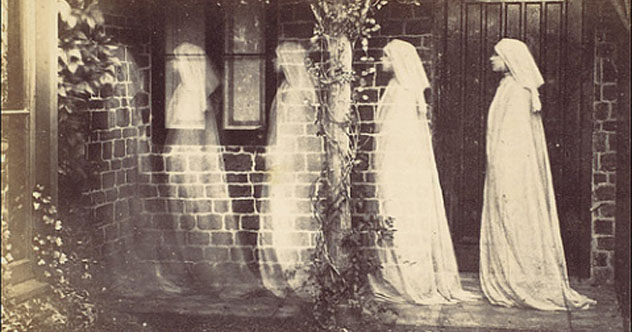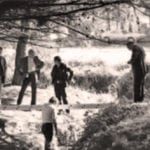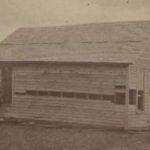 Health
Health  Health
Health  History
History Top 10 Historical Disasters Caused by Someone Calling in Sick
 Animals
Animals 10 New Shark Secrets That Recently Dropped
 Movies and TV
Movies and TV 10 Forgotten Realities of Early Live Television Broadcasts
 Technology
Technology 10 Stopgap Technologies That Became Industry Standards
 Weird Stuff
Weird Stuff 10 Wild Facts About Taxidermy That You Probably Didn’t Know
 Travel
Travel 10 Beautiful Travel Destinations (That Will Kill You)
 Miscellaneous
Miscellaneous 10 Modern Marriage Rituals Born from Corporate Branding
 Weird Stuff
Weird Stuff Ten Bizarre Visions of 2026 from Fiction
 Weird Stuff
Weird Stuff The 10 Unluckiest Days from Around the World
 Health
Health 10 Everyday Activities That Secretly Alter Consciousness
 History
History Top 10 Historical Disasters Caused by Someone Calling in Sick
 Animals
Animals 10 New Shark Secrets That Recently Dropped
Who's Behind Listverse?

Jamie Frater
Head Editor
Jamie founded Listverse due to an insatiable desire to share fascinating, obscure, and bizarre facts. He has been a guest speaker on numerous national radio and television stations and is a five time published author.
More About Us Movies and TV
Movies and TV 10 Forgotten Realities of Early Live Television Broadcasts
 Technology
Technology 10 Stopgap Technologies That Became Industry Standards
 Weird Stuff
Weird Stuff 10 Wild Facts About Taxidermy That You Probably Didn’t Know
 Travel
Travel 10 Beautiful Travel Destinations (That Will Kill You)
 Miscellaneous
Miscellaneous 10 Modern Marriage Rituals Born from Corporate Branding
 Weird Stuff
Weird Stuff Ten Bizarre Visions of 2026 from Fiction
 Weird Stuff
Weird Stuff The 10 Unluckiest Days from Around the World
10 Disturbing Tales Of Doppelgangers
According to legend, doppelgangers (German for “double-walker”) are paranormal duplicates of a real person. They can manifest in a number of ways: You can see them out of the corner of your eye, meet them on a lonely road somewhere, or, chillingly, see them standing behind you when looking in a mirror. Sometimes a doppelganger can’t be seen by the person at all, but instead manifests to other people in a completely different location. It may even cooperate with the person, help them with tasks, or act as a surrogate body of sorts.
There are many explanations for the doppelganger phenomenon. Mystics throughout the ages have believed they are supernatural creatures: either spiritual copies of the person or downright demonic twins. Meanwhile, scientists say they’re just electrical glitches of the brain, or mental illnesses such as schizophrenia. Only two things are certain about these eerie apparitions: They are often bad news, and a surprising number of significant historical figures have claimed to be haunted by them.
10 Johann Wolfgang von Goethe

Johann Wolfgang von Goethe (1749-1832) was a famous German writer, poet, and politician. A celebrated author who played a large part in shaping the field of literature, his words were widely read and respected.
One day, a depressed Goethe was riding on a footpath after leaving a girl named Frederika. Suddenly, he faced a mysterious person riding toward him. The person, who Goethe said he saw with a “mind’s eye” instead of his actual eyes, was clearly Goethe himself, although he was wearing different clothes. The figure soon disappeared, and Goethe (who found its appearance strangely soothing) soon forgot all about it.
Eight years later, he found himself riding down the same footpath in the opposite direction (to see Frederika again). That’s when he realized he was wearing the exact same clothes his doppelganger wore years ago.
This was not the only doppelganger Goethe saw. Another time, he saw his friend Friedrich walking on the street, wearing Goethe’s own dressing gown. Puzzled, Goethe went home . . . only to find Friedrich there, wearing the same gown Goethe had seen on the apparition. His friend had been surprised by the rain and borrowed the gown as his clothes dried.
9 Catherine The Great

Catherine the Great, the powerful 18th-century Empress of Russia, was a powerful and dangerous figure. She was not fazed by small matters, such as seeing her own ghostly doppelganger take over her throne.
It is said that one night, Catherine was lying in her bed when worried servants told her they’d just seen her enter the throne room. When Catherine set out to investigate, she found her doppelganger sitting calmly on the throne. Catherine immediately ordered her sentries to shoot at her ghostly counterpart.
The stories don’t tell whether the bullet had any effect on the spectral Empress. However, Catherine herself died soon afterwards . . .
8 Percy Bysshe Shelley

Percy Bysshe Shelley was a brilliant poet in his own right, although he is mainly remembered as the husband of Mary Shelley (the author of Frankenstein). Although one would assume that Mary, the horror writer, would have been the one to see ghosts and monsters, it was in fact Percy who witnessed doppelgangers.
Shortly before Percy drowned in a sailing accident in 1812, he confessed to Mary that he had met his doppelganger many times. These confrontations included one particularly haunting experience where he walked onto a terrace, only to be greeted by his doppelganger who asked him, “How long do you mean to be content?”
Strangely, Percy’s doppelganger was also witnessed by her close friend Jane Williams, who saw it passing her window (on a route frequently walked by the real Percy) to a dead end, but never returning. The real Percy was nowhere near.
7 Sir Frederick Carne Rasch

In 1906, British Parliament member Sir Gilbert Parker was attending a debate when he spotted Sir Frederick Carne Rasch, a fellow Parliament member, sitting nearby. This greatly surprised Sir Gilbert, as Sir Frederick was severely ill with influenza at the time. Still, he politely greeted Sir Frederick and told him, “I hope you are feeling better.” Carne Rasch didn’t react in any way. He just sat there with a stony, grim expression on his face.
When Sir Gilbert soon glanced at his friend again, the seat was completely empty. Bewildered, he searched for Carne Rasch in the lobby, only to find that no one had seen him pass by. When he discussed the event with fellow parliamentarians, it turned out others had seen Carne Rasch too.
When the real Carne Rasch (who had been sick in bed all along) found out about the incident, he was quite unsurprised. He had really wanted to take part in the debate so, to him, it made sense that his spirit had sneaked a peek. His family, however, was terrified and feared the doppelganger was a bad sign.
In a small way, they were right: For quite some time, Carne Rasch was annoyed by fellow Parliament members, who kept poking him with their fingers to make sure he was flesh and blood. In the end, he had to write a massively sarcastic letter to a local newspaper, apologizing that he didn’t have the good sense to die at the time of the doppelganger sighting and promising to behave better next time.
6 Queen Elizabeth I

Queen Elizabeth I of England (who reigned from 1558-1603) was the last Tudor to rule the country. Widely recognized as a charismatic, level-headed, and savvy monarch, she was the kind of person one wouldn’t expect to dabble with the paranormal.
Which makes it all the more scary when she claimed she had witnessed her doppelganger. According to the Queen, the spectral Elizabeth was lying motionless on her bed, almost like a corpse laid out for presentation. The experience was particularly haunting, because such appearances are said to be a certain sign of death. Still, it would be easy to put this down as a temporary glitch in the mind of an elderly, stressed-out ruler . . . if it wasn’t for the fact that Elizabeth died soon after seeing the doppelganger.
5 Maria de Jesus de Agreda

Although doppelgangers are generally perceived as sinister, it is said that sometimes a person is not only able to control them, but use them as a sort of second body that can “bilocate” to other places in an instant.
In the 17th century, explorers and missionaries to the New World were astonished to find that many of the tribes in New Mexico were already merrily practicing Catholicism. When questioned, the tribesmen said they had been converted by a mysterious lady in blue, who had taught them and even given them a number of crucifixes and other items of worship.
With careful detective work, a few priests finally traced the phenomenon to Maria de Agreda, a young, blue-robed Spanish nun. She claimed to have taught Christianity to the Indians by “bilocating” across the ocean. Mary had never left her convent and only knew the place she had been as “a savage land,” but her story was enough to convince the priests.
Initially, the Inquisition was extremely suspicious of Maria, but they decided to acquit her of witchcraft charges (possibly because her story was just too good to waste). Her power was declared to be of divine origin. She became an international celebrity, the leader of her convent, and an author of rambling books on how she acquired her powers. However, later in life she changed her story multiple times. Sometimes she claimed she was pressured to say she could habitually cast her spiritual copy to another continent; sometimes she said it was true after all.
4 Abraham Lincoln

Abraham Lincoln was known as “Honest Abe,” and as such was very open about his interest in the paranormal . . . at least in private discussions. According to the man himself, he also experienced some paranormal activity. On the night of his first election, he took a moment to rest on his couch one evening. While lying there, he happened to glance in a mirror and saw his own visage—except that he had two faces.
A second Lincoln, pale and ghostly, was looking at him from the mirror, right next to his own face. Startled, he rose from the couch . . . and the doppelganger disappeared. He sat back down, only to see it again.
Lincoln was startled, but his wife Mary was downright terrified. She was convinced that the doppelganger was bad news—a certain sign that Lincoln would be re-elected on a second term (possibly because two Lincolns equals two terms), but wouldn’t survive it (because the second Lincoln looked deathly).
Lincoln went on to repeat the couch experiment every once in a while. He did manage to glimpse the doppelganger one more time, but after that it stopped appearing. Maybe it had delivered its message, as Lincoln indeed didn’t make it through his second term.
Or, you know, maybe someone just fixed the mirror.
3 George Tryon

June 22, 1893 was not a good day for Vice Admiral George Tryon. He was commanding two columns of ships off the coast of Syria, when he gave a command for the columns to turn toward each other. This attempt at a majestic naval drill maneuver turned out to be an amateur mistake, as the first ships promptly rammed into each other, and one of them—the one Tryon happened to be in—sank like a stone. Tryon died knowing that he had just doomed 357 men to drown. His last words were, fittingly and heartbreakingly, “It is entirely my fault.”
At the exact same time, Tryon’s wife was holding a lavish party for their friends in their London home. Suddenly, to the guests’ surprise, Tryon appeared at the party. Silently, he walked down a staircase, solemnly proceeded through the drawing room, and opened the door as if to leave . . . before he suddenly disappeared.
He was dressed in full uniform, as if he was commanding a drill.
There are some holes in the story. For instance, some say Lady Tryon was busy with the guests and never saw this doppelganger, while others claim she was one of the onlookers. Still, the tale bears eerie resemblance to old sea tales of a sailor’s “fetch” (another name for a spirit doppelganger) alerting his family upon his death.
2 Guy de Maupassant

French writer Guy de Maupassant is known for what is perhaps the most intimate doppelganger experience on record. Toward the end of his life, he is said to have regularly interacted with his doppelganger. This eerie twin not only talked to him, but actually sat down and started dictating a short story to him. Yes, de Maupassant claimed that one of his last stories was literally ghostwritten—by his own ghost, no less.
If that’s not chilling enough, don’t worry, it gets even better. The story the spirit allegedly dictated to de Maupassant was “The Horla,” an unnerving tale of a man whose sanity is slowly consumed by an evil spirit that uses him as a host. As if echoing the story, de Maupassant’s mental health started deteriorating soon after finishing it.
In another version of the events, the doppelganger did not dictate the book, as it disappeared when the terrified de Maupassant called his servant. However, the apparition returned a few months later. It entered the writer’s room, looking at him with a sad expression. Then it sat down and buried its face in its hands, as if in despair. Convinced that the doppelganger brought news of disaster, the horrified de Maupassant’s life was downhill from there. He died in an insane asylum a year later.
1 Emilie Sagee

Emilie Sagee never saw her doppelganger. Everyone else did, though.
Sagee worked in an exclusive girls’ school. She was a very good teacher, but for some reason she kept moving from one job to another. In 16 years, she had changed positions an impressive 19 times.
In 1845, the school found out why.
Sagee was allegedly the center of some very strange doppelganger activity. Her spectral twin was first seen during a class, as 13 students witnessed the doppelganger standing by Sagee’s side and mirroring her movements. Next, it stood behind her as she ate, pantomiming her movements. Sagee herself was completely oblivious to the apparition, despite the fact that everyone else could see it clearly. However, she did become strangely groggy and powerless during the times the doppelganger manifested, and the wraith was often seen doing things Sagee later said she had been thinking about at the moment, suggesting that she may have had some subliminal control over it.
Soon, the doppelganger ventured beyond Sagee’s immediate vicinity. At first, it appeared to a classroom full of students, sitting calmly in the teacher’s chair while Sagee herself was outside, working in the garden. The few people who dared to approach the doppelganger found they could pass through it, yet it had a texture that reminded them of thick fabric.
Time went by and the apparition became a permanent fixture of the school’s life, freaking people out on a regular basis. The girls’ concerned parents started removing their children from the school. Although Sagee was a model employee on all non-paranormal accounts, the headmistress had no option but to fire her and her ghostly double.
Pauli Poisuo also writes for Cracked.com. Why not follow him on Twitter?




![10 Creepiest Photos Of Victims Taken By Serial Killers [DISTURBING] 10 Creepiest Photos Of Victims Taken By Serial Killers [DISTURBING]](https://listverse.com/wp-content/uploads/2018/09/Regina-Kay-Walters-featured-2-150x150.jpg)



